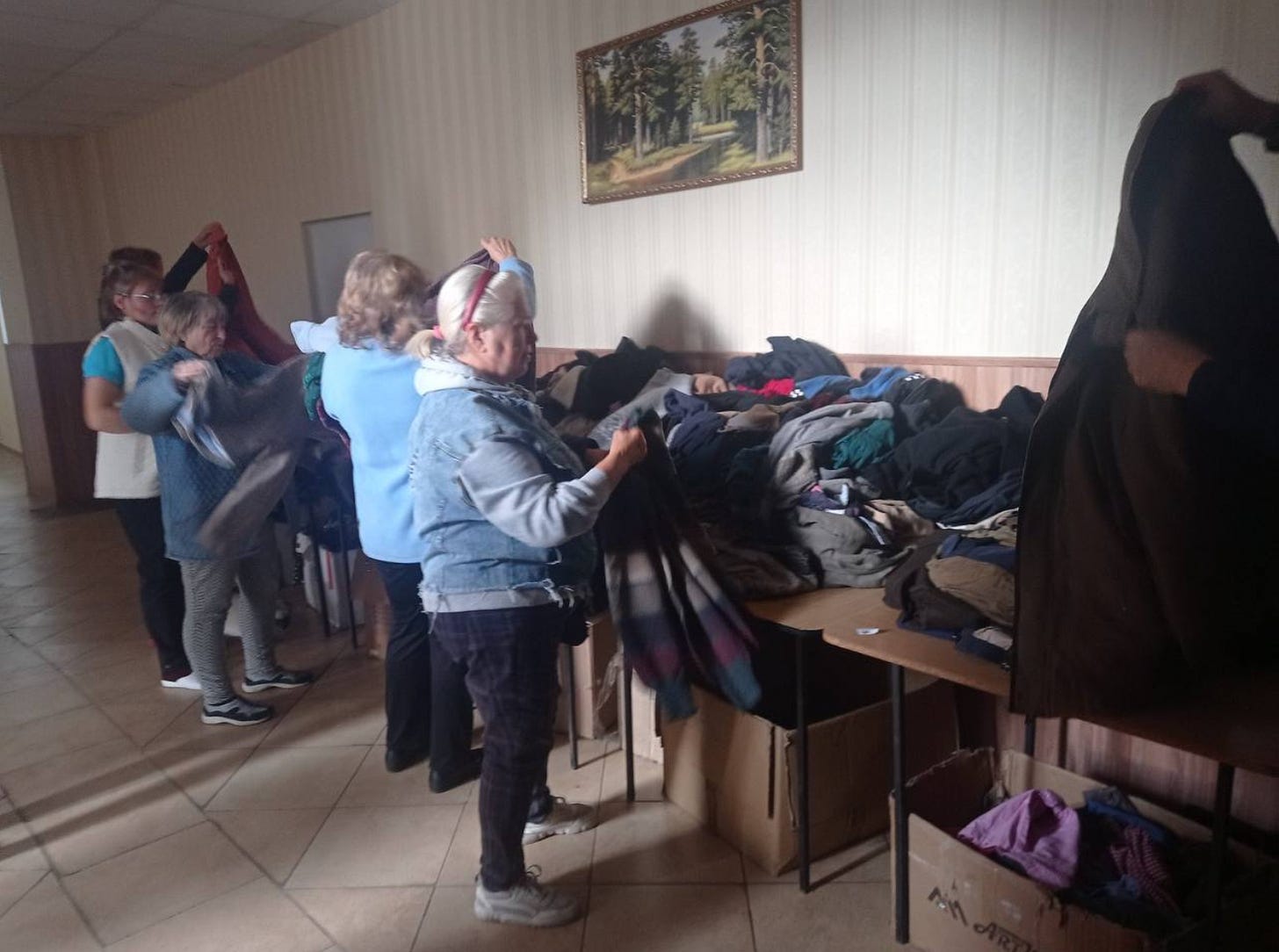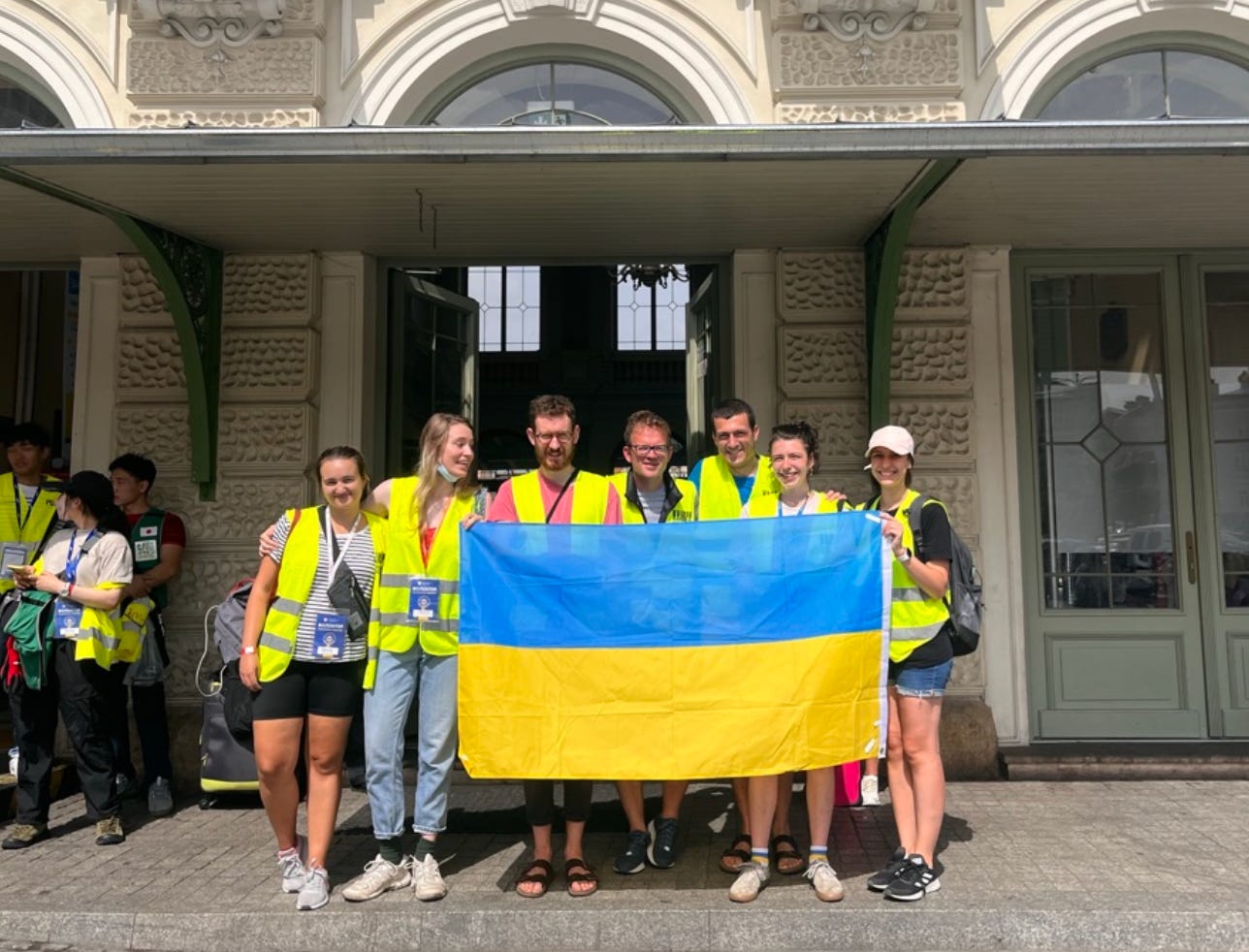The end of summer
The past month has been hugely busy for KHARPP. As well as maintaining our active presence at Przemyśl train station assisting refugees, we have also managed to send nearly two hundred humanitarian aid packages to the worst-hit regions of eastern Ukraine. Additionally, we reached a significant milestone in our ongoing collaboration with Kharkiv Aid Office by delivering our tenth ambulance to them. This one was filled with high-value medical supplies brought over from the USA, as well as large quantities of non-perishable food and over a tonne of clothes collected around the UK by Biblioteka Kyiv, SSEES Society, and individual donation drives in Oxford, Cambridge, and Cardiff. It is now being used to evacuate civilians from recently liberated territories in the wider Kharkiv region.
Since our last post, where we reported on the acquisition of our new van we have been able to do regular runs to Lviv, each time loaded up to the roof with supplies. In the last week of September alone we sent some four tonnes of clothes, shoes, bedding, mattresses, food, and everyday medicine to Kharkiv and the Donetsk region. Much of this is currently being distributed to IDPs from the newly liberated territories in the Kharkiv region. After the triumph of the Ukrainian counteroffensive in mid-September, it quickly became clear that there was a humanitarian catastrophe in the areas vacated by the Russian army, where people had been under occupation for some six months. As a result of the fighting and the vindictiveness of the departing Russians, most of the liberated towns and villages have been rendered uninhabitable. Local volunteers, including our friends at Kharkiv Aid Office, are busy evacuating the remaining inhabitants of these areas to the relative safety and comfort of Kharkiv city, where it is easier to provide for them. They arrive at a hospital-turned-reception centre in the city, where they can get some food, request medical care and medicine, and also help themselves to the clothes we have sent. They are then temporarily housed in empty student accommodation. All of these people will need basic support over the coming months, and we are working with our partners in Kharkiv to provide for them as efficiently and effectively as we can with the resources that we have at our disposal. It is thanks to you that we have been able to help these evacuees so far, and we are counting on your continued support as we head into the colder, harder months ahead.
As always, none of this would be possible without the work of our amazing volunteers. Nathan, from London, came out to join our team in Przemyśl in mid-August, and stayed with us for three weeks. Here he shares some of his experiences and describes the situation at that time.
‘After I finished teaching in a nursery in South London I travelled to Przemyśl in mid-August to volunteer for KHARPP. The first few days were a blur; long days where I learned the ropes and I quickly became acquainted with the energy and frequent chaos of Przemyśl station. I learned which trains departed from which platforms, where all the money changers were (and which had the best rate), and vitally, to remember to bend my knees when carrying luggage. On top of all that I was brought up to speed with how the station had changed over the last few months and what further changes were on the horizon.
Six months into the conflict and the flow of people fleeing Ukraine for safety in Europe was still steady. Almost every night we put families from Mariupol, Mykolaiv and Donbas into hotel rooms. These were families with young children, mothers and children who had left their husbands/fathers behind, or elderly women whose sons had died on the front line. One afternoon I found a hotel room for a woman from Melitopol in occupied Ukraine who had spent two weeks navigating Russian checkpoints before managing to make her way to the Polish border.
However, it also appeared that more people were now heading back into Ukraine than leaving it. The reasons for returning to Ukraine were many. Some had taken the decision that it would be safe to return home, others had struggled to settle and build a new life in Europe, or people were taking short trips into Ukraine to check on property or gather their belongings. I once helped an actress get on the Kyiv train with her young baby; she was going there for three days while her husband was on leave from the front. All of this movement into Ukraine meant that the queues of people waiting to go through passport control were very long, and what with the frequent delays, they could sometimes be standing there for hours.
Besides the flow of Ukrainians, the wider humanitarian context was also changing. When I started at the station I was told how the number of free trains and buses for Ukrainians to travel further into Europe had diminished, though there were still regular buses to Warsaw (with its own large refugee centre), a repatriation bus to Lviv, and a train to Hannover that ran ever other day. In my three weeks at the station both the Warsaw and Lviv buses stopped running, leaving just the Hannover train. The financial burden of travelling into Europe now fell primarily onto Ukrainians themselves. This was hard news to deliver, since many Ukrainians had heard of the free transport options earlier available and came to Przemyśl with a preconceived notion of what they could do.
Where possible, we could use charity money to help in cases of severe need. I helped a group of nine vulnerable people get tickets to Berlin, where they hoped to travel further into western Germany. Because of the scarcity of Berlin train tickets (the daily direct Berlin train being one of the busiest) I nearly didn’t manage to get them all on the same train, but luck was on our side, and one Friday morning I saw them onto the train. A group of us helped them on, bags, wheelchair, buggy, and all. It was a great relief to see them depart safely westward.
While we were still doing what we could in Przemyśl, we heard how it was becoming more difficult for refugees to find shelter in Europe. In my second week we heard that the majority of Germany’s regions were now declaring that they were full and could host no more Ukrainians. In fact this affected the group of nine we had sent to Berlin; when I last spoke to them they had stayed in three separate refugee centers and after being in Germany for over two weeks did not know what their next step would be. As yet more Ukrainians arrived in Poland, it felt like settlement options were disappearing and as a result it was harder to give them concrete guidance and support.
That said, there was still lots to do in the station. We did our best to give as clear and wide a picture of travel options as possible, whilst also providing suitcases, buggies, clothes, or blankets to those who needed them. In my last week in Przemyśl I also spent a lot of time assisting with another arm of KHARPP’s charity work, namely sending aid boxes to families living in eastern Ukraine.
A team of four of us packed aid boxes upon the individual requests of families living mostly in the small city of Druzhkivka [in Donbas]. We filled the boxes with food, hygiene products, and clothes. In this way we could support those families that had chosen to remain in Ukraine. This is especially important work given the rapidly approaching winter, which huge amounts of Ukrainians will be greeting with no heating, running water, or regular electricity. The general consensus in the station was that the coming winter would see a fresh wave of refugees fleeing Ukraine, unable to continue living in villages, towns, and cities rendered defenseless against the winter by the Russian army.
It had been an intense three weeks in Poland during which I met hundreds of Ukrainians and many a kind and helpful volunteer. I returned to London just as the summer heat evaporated and an autumn chill began to set in. Back home, I spent the next few days doing very little, as I slept off my station fatigue. I was cheered to read the good news from the Ukrainian army, to see that there was some hope of Ukraine securing its borders once again. However, it is clear that there’s still much to do to help Ukrainians, both those who choose to stay and those who choose to flee the country.
As long as Russian missiles continue to fly, there is work to be done.’
Special thanks to Nathan for this report and to all our volunteers for their hard work on the ground in Przemyśl, to Angela Cole-Fontayn, Louise Thomas, and Martin Daddy for driving around the UK collecting donations and to all the people who helped organize and donated to our marathon donation drive in the UK over the summer. An especially big thanks to Conrad Griffin for his extraordinary efforts in fundraising to buy the ambulance and the medical supplies, flying over from the USA with the supplies in two large, overweight suitcases, and driving the ambulance all the way from Shropshire to Lviv via Przemyśl. All of your collective efforts have enabled us to support many people currently living through the nightmare of war in eastern Ukraine. During what feels like an endless cycle of bad news globally, we really appreciate your continued attention and interest in our work. We’ve got big plans for the coming months, so stay with us, keep donating via our JustGiving and PayPal - and as always, Slava Ukraini!
IDPs sort through the clothes we sent to Kharkiv.
The contents of an aid box, sent to Druzhkivka.
Delivering aid to a children’s hospice in Kharkiv.
Our team of Przemyśl volunteers in late August.










This leaves us all in no doubt about the positive, effective and highly targeted impact that such a small charity as KHARPP is able to deliver. Thank you all for stepping up to your power of leadership on the ground in Poland and Ukraine . Slava Ukraini